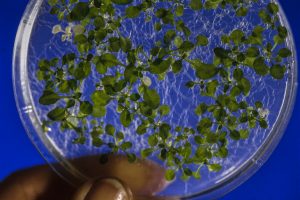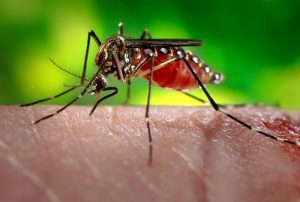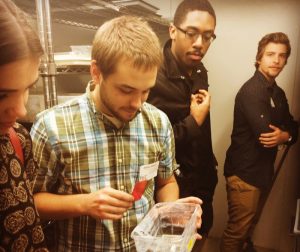Enter your address to receive notifications about new posts to your email.
Articles tagged Evolution
(101 results)
-
Tales told by ancient human DNA
Archaeologists have long known how to extract millennia-old stories from a single tooth buried in an ancient ruin—and now geneticists have the tools to join them. Advances made in the last several years have enabled researchers to sequence tiny amounts of DNA preserved in very old specimens, such as the material inside a tooth from…
-
Hyper-conserved sperm proteins can still evolve rapidly
The fastest-evolving genes in eukaryotes commonly encode reproductive proteins—and the rate at which genes for male reproductive proteins change, in particular, often vastly outstrips the rate of change across the genome as a whole. A recent paper in G3: Genes|Genomes|Genetics describes an unusual exception: the amino acid sequences of the most abundant sperm proteins in…
-
A fly that thrives on a deadly diet
When a noni fruit ripens, it stinks like old cheese—or even vomit. Familiar to many in the form of expensive juices sold as health supplements, this pungent fruit is engaged in a slow-motion arms race with would-be insect pests. Fruit flies are unable to feast on noni—scientific name Morinda citrifolia—because the fruit is dosed with…
-
Random Factors: An Interview with 2017 Thomas Hunt Morgan Medal Recipient Richard C. Lewontin
The Thomas Hunt Morgan Medal is awarded to an individual member of the Genetics Society of America for lifetime achievement in the field of genetics. It recognizes the full body of work of an exceptional geneticist. The 2017 recipient is Richard C. Lewontin, whose contributions and influence have profoundly shaped the field of evolutionary genetics.…
-
Beautiful Piles of Bones: An Interview with 2017 Genetics Society of America Medal Recipient David M. Kingsley
The Genetics Society of America Medal is awarded to an individual for outstanding contributions to the field of genetics in the last 15 years. Recipients of the GSA Medal are recognized for elegant and highly-meaningful contributions to modern genetics, exemplifying the ingenuity of GSA membership. The 2017 recipient is David M. Kingsley, whose work in…
-
An extra chromosome that does double duty
Inheriting an extra chromosome can sometimes be disastrous, but in the September issue of G3, Linder et al. investigate a chromosome duplication that helps yeast survive harsh conditions. Yeast with an extra copy of chromosome IV better tolerate hydrogen peroxide exposure, largely thanks to an extra copy of a gene that detoxifies the chemical. This…
-
A gene linked to human obesity also controls fat deposition in plants
There’s no such thing as an obese plant. But that doesn’t mean plants can’t teach us something about fat. In the September issue of GENETICS, Ducos et al. show that a protein that controls fat accumulation in humans has a similar function in Arabidopsis. They also find that the human and plant proteins may be…
-
Fast-evolving female-biased genes defy expectations in mosquitoes
Genes involved in male reproduction tend to evolve rapidly. This has been observed in many different species and is thought to be due to sexual selection as males compete over mating opportunities. But in the August issue of GENETICS, Whittle and Extavour present results that flip this paradigm upside down. They find that in the…
-
Revisiting Waddington: A new explanation for an old experiment
In the 1940s, C. H. Waddington discovered a peculiar phenomenon in fruit flies: traits could appear in response to environmental stress in an individual’s lifetime and then be passed down to future generations. Waddington proposed that this wasn’t the inheritance of acquired traits, but actually due to pre-existing genetic variation that had no effect until…
-
Evolution in Philadelphia
Guest post by Aurora MacRae-Crerar. Hosted at the University of Pennsylvania, this year’s Evolution in Philadelphia Conference (EPiC) aimed to foster collaboration among early career evolutionary biologists. The conference was sponsored in part by the Genetics Society of America (GSA) through its Career Development Symposia program, which supports events that contribute to the career development of early…
-
Lineage specific retrotransposons shaped the genome evolution of domesticated rice
Rice is one of the most important food crops on earth. Like many other plants, the genome of this critical global species is dominated by transposable elements—selfish genes that multiply themselves to the detriment of their host. In the June issue of G3, Zhang and Gao analyze the genomic long terminal repeat (LTR) retrotransposon content…


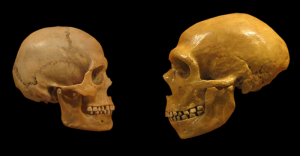

![Image by Michael Hermann (Own work) [CC BY-SA 3.0], via Wikimedia Commons.](https://s43361.pcdn.co/wp-content/uploads/2018/01/Webp.net-resizeimage-19-300x225.jpg)
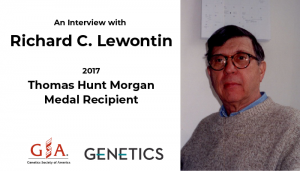

![Photo by publicdomainpictures.net. [CC0]](https://s43361.pcdn.co/wp-content/uploads/2017/09/red-doubledecker_770x-300x199.jpg)
